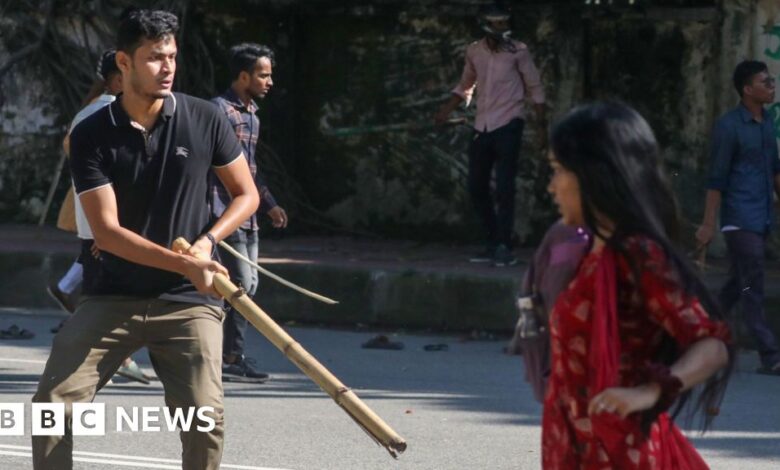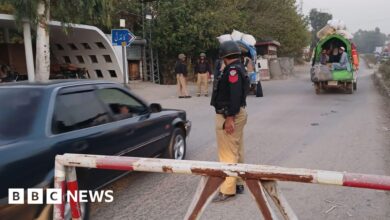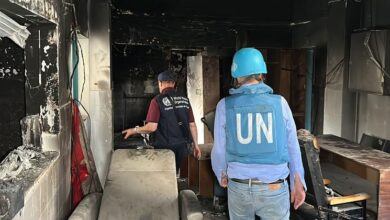Deadly unrest over job quotas engulfs Bangladesh

Schools and universities across Bangladesh have been closed until further notice after six people were killed in protests against government job quotas.
University students have been protesting for days against the system of providing public sector jobs to the children of war heroes who fought for the country’s independence from Pakistan in 1971.
Some jobs are also reserved for women, minorities, and people with disabilities.
A third of the places are reserved for the children of those classified as war heroes. Students say the system is discriminatory and want recruitment based on merit.
This week, several cities, including the capital Dhaka, have seen clashes between supporters of the anti-quota movement and protesters, particularly the ruling Awami League’s student wing, known as the Bangladesh Chhatra League (BCL).
Groups of students attacked each other with bricks and sticks. Police fired tear gas and used rubber bullets to disperse the clashing groups. Student activists said hundreds of people were injured in the attacks.
“We blame the BCL members for the violence. They killed the protesters. The police did not intervene to save ordinary students,” Abdullah Salehin Ayoun, one of the coordinators of the anti-quota movement, told the BBC.
Government jobs are highly coveted in Bangladesh because they pay well. In total, more than half of the positions – numbering in the hundreds of thousands – are reserved for certain groups.
Critics say the system unfairly benefits the children of pro-government groups that support Prime Minister Sheikh Hasina, who won a fourth straight election in January.
Ms Hasina’s government lifted the ban in 2018 after protests.
But a court ordered the government to restore the quotas in early June, sparking the latest wave of protests.
Officials said three people were killed in the southern port city of Chittagong and two in Dhaka, while a student was killed in the northern city of Rangpur by stray bullets.
Media reports said at least three of those killed were students, although there has been no official confirmation.
The government blames opposition groups for the violence.
“The student front of the opposition party Jamaat-e-Islami and the Bangladesh Nationalist Party [BNP] have infiltrated this anti-quota movement. They are the ones who initiated the violence,” Law Minister Anisul Huq told the BBC.
Bangladesh’s Supreme Court suspended the current system last week, but protests are expected to continue until it is permanently scrapped.
“The case was listed for hearing on August 7. The students were given an opportunity to present their arguments in court,” Mr Huq said.
In a late-night operation on Tuesday, police raided the headquarters of the BNP, the main opposition party, in Dhaka, following violent clashes.
Senior BNP leader Ruhul Kabir Rizvi said the raid was just a drama and a message to the students to go home.
Protests have been going on for days as students have blocked roads and highways in Dhaka and other major cities, bringing traffic to a standstill.
Student leaders said they were angry at recent comments by Ms Hasina, who they said had described those protesting against job quotas as razakar – a term used to refer to people accused of collaborating with the Pakistani military during the 1971 war.
Some student leaders said Ms Hasina had insulted them by comparing them to razakar. They said the comparison also encouraged BCL members to attack them.
“They want to suppress our voices by creating a reign of terror in the country. If I don’t protest today, they will beat me up another day. That’s why I took to the streets to protest,” Rupaiya Sherstha, a student at Dhaka University, told the BBC.
But government ministers said Ms Hasina’s comments had been misinterpreted and she had not called the students. razakar.
Mohammad Ali Arafat, the Minister of Information and Broadcasting, denied allegations that the Awami League student group was behind the violence.
He said trouble began after anti-quota students threatened residents of a hall in Dhaka.
“If there is chaos in the universities, it is not in the government’s interest. We want to maintain peace,” Mr Arafat told the BBC.
UN Secretary-General António Guterres has called on the government to “protect protesters from any form of intimidation or violence,” according to spokesman Stephane Dujarric.
The students have vowed to continue their protests until their demands are met.
The government has stepped up security by deploying a paramilitary force, the Bangladesh Border Guard, in five major cities, including Dhaka and Chittagong.




